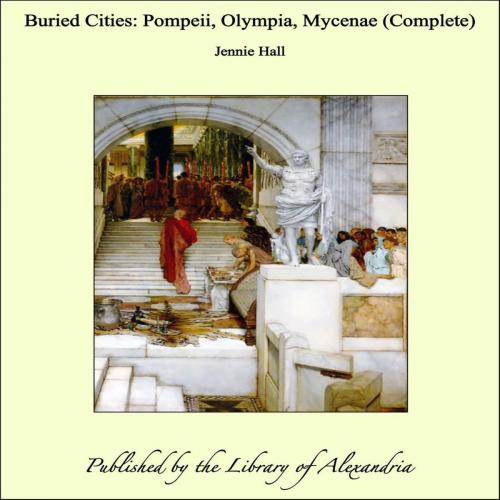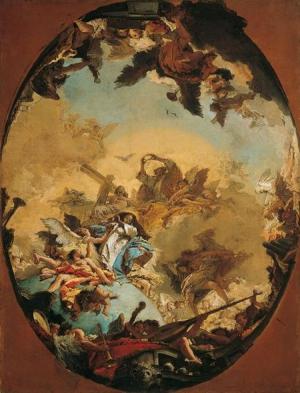Buried Cities: Pompeii, Olympia, Mycenae (Complete)
Nonfiction, Religion & Spirituality, New Age, History, Fiction & Literature| Author: | Jennie Hall | ISBN: | 9781465555816 |
| Publisher: | Library of Alexandria | Publication: | March 8, 2015 |
| Imprint: | Language: | English |
| Author: | Jennie Hall |
| ISBN: | 9781465555816 |
| Publisher: | Library of Alexandria |
| Publication: | March 8, 2015 |
| Imprint: | |
| Language: | English |
THE GREEK SLAVE AND THE LITTLE ROMAN BOY Ariston, the Greek slave, was busily painting. He stood in a little room with three smooth walls. The fourth side was open upon a court. A little fountain splashed there. Above stretched the brilliant sky of Italy. The August sun shone hotly down. It cut sharp shadows of the columns on the cement floor. This was the master's room. The artist was painting the walls. Two were already gay with pictures. They showed the mighty deeds of warlike Herakles. Here was Herakles strangling the lion, Herakles killing the hideous hydra, Herakles carrying the wild boar on his shoulders, Herakles training the mad horses. But now the boy was painting the best deed of all—Herakles saving Alcestis from death. He had made the hero big and beautiful. The strong muscles lay smooth in the great body. One hand trailed the club. On the other arm hung the famous lion skin. With that hand the god led Alcestis. He turned his head toward her and smiled. On the ground lay Death, bruised and bleeding. One batlike black wing hung broken. He scowled after the hero and the woman. In the sky above him stood Apollo, the lord of life, looking down. But the picture of the god was only half finished. The figure was sketched in outline. Ariston was rapidly laying on paint with his little brushes. His eyes glowed with Apollo's own fire. His lips were open, and his breath came through them pantingly. "O god of beauty, god of Hellas, god of freedom, help me!" he half whispered while his brush worked. For he had a great plan in his mind. Here he was, a slave in this rich Roman's house. Yet he was a free-born son of Athens, from a family of painters. Pirates had brought him here to Pompeii, and had sold him as a slave. His artist's skill had helped him, even in this cruel land. For his master, Tetreius, loved beauty. The Roman had soon found that his young Greek slave was a painter. He had said to his steward: "Let this boy work at the mill no longer. He shall paint the walls of my private room
THE GREEK SLAVE AND THE LITTLE ROMAN BOY Ariston, the Greek slave, was busily painting. He stood in a little room with three smooth walls. The fourth side was open upon a court. A little fountain splashed there. Above stretched the brilliant sky of Italy. The August sun shone hotly down. It cut sharp shadows of the columns on the cement floor. This was the master's room. The artist was painting the walls. Two were already gay with pictures. They showed the mighty deeds of warlike Herakles. Here was Herakles strangling the lion, Herakles killing the hideous hydra, Herakles carrying the wild boar on his shoulders, Herakles training the mad horses. But now the boy was painting the best deed of all—Herakles saving Alcestis from death. He had made the hero big and beautiful. The strong muscles lay smooth in the great body. One hand trailed the club. On the other arm hung the famous lion skin. With that hand the god led Alcestis. He turned his head toward her and smiled. On the ground lay Death, bruised and bleeding. One batlike black wing hung broken. He scowled after the hero and the woman. In the sky above him stood Apollo, the lord of life, looking down. But the picture of the god was only half finished. The figure was sketched in outline. Ariston was rapidly laying on paint with his little brushes. His eyes glowed with Apollo's own fire. His lips were open, and his breath came through them pantingly. "O god of beauty, god of Hellas, god of freedom, help me!" he half whispered while his brush worked. For he had a great plan in his mind. Here he was, a slave in this rich Roman's house. Yet he was a free-born son of Athens, from a family of painters. Pirates had brought him here to Pompeii, and had sold him as a slave. His artist's skill had helped him, even in this cruel land. For his master, Tetreius, loved beauty. The Roman had soon found that his young Greek slave was a painter. He had said to his steward: "Let this boy work at the mill no longer. He shall paint the walls of my private room















